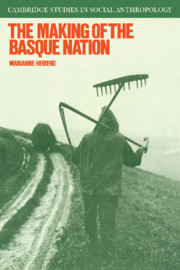Book contents
- Frontmatter
- Contents
- List of maps
- Preface
- Introduction: empire and the emergence of Spain
- Part 1 From plurality to Basque ethnic solidarity
- 1 The Basques in history
- 2 The foundations of the modern Basque country
- 3 History as myth
- 4 From the illuminated few to the Basque moral community
- 5 The moral community and its enemies
- 6 ‘España, una, libre y grande’
- 7 The moral community, from clandestinity to power
- Part 2 Inside the moral community: the village of Elgeta, Guipúzcoa
- Postscript
- Conclusion: ethnic nationalists and patron–clients in Southern Europe
- Notes
- Biblography
- Index
- Cambridge Studies in Social Anthropology
6 - ‘España, una, libre y grande’
Published online by Cambridge University Press: 19 October 2009
- Frontmatter
- Contents
- List of maps
- Preface
- Introduction: empire and the emergence of Spain
- Part 1 From plurality to Basque ethnic solidarity
- 1 The Basques in history
- 2 The foundations of the modern Basque country
- 3 History as myth
- 4 From the illuminated few to the Basque moral community
- 5 The moral community and its enemies
- 6 ‘España, una, libre y grande’
- 7 The moral community, from clandestinity to power
- Part 2 Inside the moral community: the village of Elgeta, Guipúzcoa
- Postscript
- Conclusion: ethnic nationalists and patron–clients in Southern Europe
- Notes
- Biblography
- Index
- Cambridge Studies in Social Anthropology
Summary
The unity of Franco's Spain
Publicly the Basque nationalist community ceased to exist with the collapse of Euzkadi. The physical punishment of the Basques was to a certain extent restrained because Franco needed to retain the goodwill of Basque industrialists. But the Caudillo wanted to create what no other Spanish leader had managed – ‘España, una, libre y grande’ (Spain, united, free and great).
On the cultural level the unity of the Spanish nation was to be expressed and symbolized by the unity of Spanish culture and language. Franco regarded Basque culture, especially the language, as an excuse for and sign of separatism. Therefore, the regime unleashed a thorough campaign of cultural repression. The public use of Basque greetings, traditional garments, folklore, Basque names, publications and the teaching of Euskera were strictly forbidden. These prohibitions were backed by a formidable armoury of government decrees, of which the following represent only a small sample.
Orden 18–V–1938 (B.O. 21-V-38)
Norms concerning inscription in the civil register.
[There exist] … a large number of names which not only are expressed in a language distinct from official Castilian, but which imply a meaning contrary to the unity of the fatherland … The Spain of Franco will not tolerate aggressions against the unity of its language … It should be noted that the origin of these anomalies (in the register) is due to a morbid exacerbation of regionalist sentiment in some provinces … This is what occurs in the Vascongadas, for example, with the names Iñaki, Kepa, Koldobika and others which undeniably have separatist meaning.
- Type
- Chapter
- Information
- The Making of the Basque Nation , pp. 90 - 102Publisher: Cambridge University PressPrint publication year: 1989



